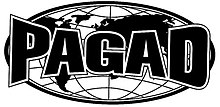People Against Gangsterism and Drugs
 |
|
| Type | Vigilante group |
|---|---|
| Legal status | Active |
| Location | |
|
Region served
|
Africa |
| Website | www |
People Against Gangsterism and Drugs (PAGAD) was a vigilante group formed in 1996 in the Cape Flats area of Cape Town, South Africa.
PAGAD was originally initiated by a handful of PAC and community members from a Cape Town townships who decided to organize public demonstrations to pressure the government to fight the illegal drug trade and gangsterism more effectively. However, PAGAD increasingly took matters into their own hands, believing the police were not taking enough action against gangs. Initially the community and police were hesitant to act against PAGAD activities, recognising the need for community action against crime in the gang-ridden communities of the Cape Flats.
Notorious gangsters were initially asked by PAGAD members to stop their criminal activities or be subject to 'popular justice'. A common PAGAD modus operandi was to set fire to drug dealers houses and kill gangsters. PAGAD's campaign came to prominence in 1996 when the leader of the Hard Livings gang, Rashaad Staggie, was beaten and burnt to death by a mob during a march to his home in Salt River. South Africa's police quickly came to regard PAGAD as part of the problem, rather than a partner in the fight against crime and they were eventually designated a terrorist organization by the South African government.
Changes within the organisation following the incidences of 1996 increased the influence of more highly politicised and organisationally experienced people within it associated with radical Islamic groups such as Qibla. This caused a series of changes such as the emergence of new leadership and the development of tighter organisational structures. This succeeded in transforming PAGAD from a relatively non-religious popular mass movement into a smaller, better organised but also a religiously radical isolated group.
The threat of growing vigilantism in 2000 led the Western Cape provincial government to declare a 'war on gangs' that became a key priority of the ANC provincial government at the time.
Although PAGAD's leadership denied involvement, PAGAD's G-Force, operating in small cells, was believed responsible for killing a large number of gang leaders, and also for a bout of urban terrorism — particularly bombings — in Cape Town. The bombings started in 1998, and included nine bombings in 2000. In addition to targeting gang leaders, bombing targets included South African authorities, moderate Muslims, synagogues, gay nightclubs, tourist attractions, and Western-associated restaurants. The most prominent attack during this time was the bombing on 25 August 1998 of the Cape Town Planet Hollywood.
...
Wikipedia
